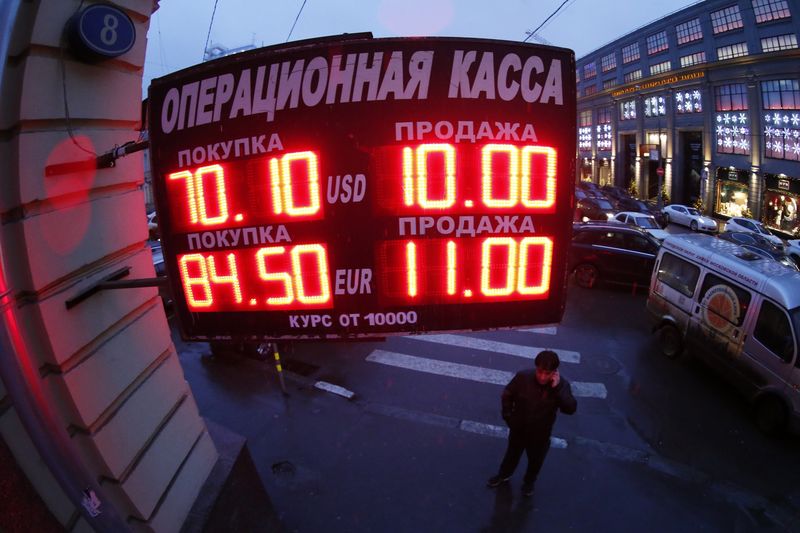By Jonathan Gould
FRANKFURT (Reuters) - Western companies are curtailing investments in Russia, repatriating funds and talking with their banks about currency hedges to protect profits from the falling rouble and worsening growth outlook.
Carmakers including Volkswagen (DE:VOWG_p), Jaguar Land Rover (NS:TAMO), Audi and BMW (DE:BMWG) have already dialled back business while others, such as Finnish retailer Stockmann (HE:STCBV), and Swedish-based furniture maker IKEA, want to stay but are wary of developments.
Collapsing oil prices and a punishing round of sanctions over Ukraine are pushing Russia into recession and frustrating thousands of Western companies with business there who see little prospect the political deadlock will be broken.
"I am greatly concerned by signs of dogmatism in the discussion and that dialogue is decreasing rather than increasing," Olaf Koch, the chief executive of German retailer Metro (DE:MEOG), said of the standoff between Russia and the West.
The sanctions have compounded the battering that the oil-dependent economy is taking, prompting a 50 percent drop in the rouble this year. The central bank has said GDP could contract by 5 percent next year if oil stays around $60 (38 pounds) per barrel.
Carmakers are among those to have taken the most drastic steps, with the economic downturn eating into consumer budgets for big ticket items.
"In view of the volatility of rouble exchange rate and with the aim to manage its business risk, GM Russia has decided to temporarily suspend wholesaling of vehicles to its dealers in Russia as of Dec. 16," GM's European Opel division said.
Earlier this week, Apple (O:AAPL), which does not operate retail stores of its own in Russia, said it was halting online sales of its products "due to extreme fluctuations in the value of the rouble."
Late on Thursday, Germany's BASF (DE:BASFn) and Russia's Gazprom (MM:GAZP) abandoned a long-planned gas assets swap, citing a "difficult political environment".
Other companies are staying the course but are worried about the uncertainty of the situation.
"Visibility is zero, the ball is entirely with Russian government and central bank," said Lauri Veijalainen, an executive at Finnish retailer Stockmann (HE:STCBV), which has seven upscale department stores in Russia.
Stockmann and Swedish-based furniture maker IKEA, which has 14 stores and 14 shopping centres in Russia, both plan to raise prices in an effort to compensate for the rouble's fall.
Others companies are planning to open fewer stores. German retail sportswear firm Adidas AG (DE:ADSGn), which runs 1,100 stores in Russia accounting for more than 7 percent of group sales, said it would open only 30 stores per year in 2014 and 2015, down from an already reduced target of 80 per year.
However, a strategy of raising prices and reducing investment may not be enough if the economy sinks into recession, further hitting jobs and spending, particularly after the Christmas rush.
"The consumer is coping for now but at the same time there's a lot of fear that this is going to change rapidly post-Christmas," said Andrew Cosgrove, Global Lead Analyst, Consumer Products and Retail at accounting consultancy EY.
Some companies are already reporting pressure to cut prices.
"Italian firms working with Russian partners are receiving requests for discounts and for a renegotiation of their contracts to include conditions factoring in movements of the rouble," said Armando Ambroisio, a lawyer working in the Russian unit of Italian law firm De Berti–Jacchia.
While the rouble has recovered from lows tested earlier this week on the view that the currency's collapse this year may have gone too far, companies are unsure about where it could go next.
"We are extracting liquidity from Russia more often and in smaller chunks than usual due to the turbulence there, and the fear of capital control," said Jens Krogsgaard, Vice President for Group Finance at Danish Insulation maker Rockwool (CO:ROCKb).
Big Western bank players like Societe Generale (PA:SOGN), BNP Paribas (PA:BNPP) and Deutsche Bank (DE:DBKGn) are expected to continue serving their clients in Russia, though a recession would inevitably cut local revenues.
Austrian lender Raiffeisen Bank International (VI:RBIV) said the rouble's fall had cut its overall capital ratio by one percentage point this year.
Many companies are also worried by the long-term hit from sanctions.
Germany's machine tool industry, which counts on Russia for about 4 percent of its exports, sees sanctions giving a boost to competitors from countries like Switzerland and China who are not applying sanctions.

"When the crisis ends, they will not voluntarily leave Russia again," said VDMA engineering association head Reinhold Festge. "We are losing market share."
(Additional reporting by Ben Hirschler, Emma Thomasson, Matthias Inverardi, Jussi Rosendahl, Maria Kiselyova, Martinne Geller, Teis Jensen, Eric Auchard, Francesca Landini and Maria Sheahan; Writing by Jonathan Gould; editing by Thomas Atkins and Anna Willard)